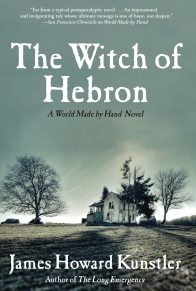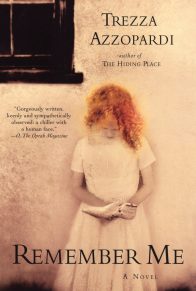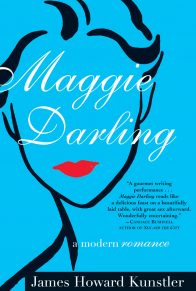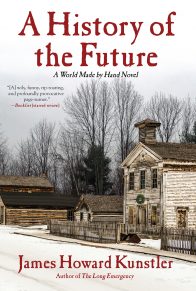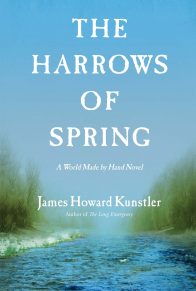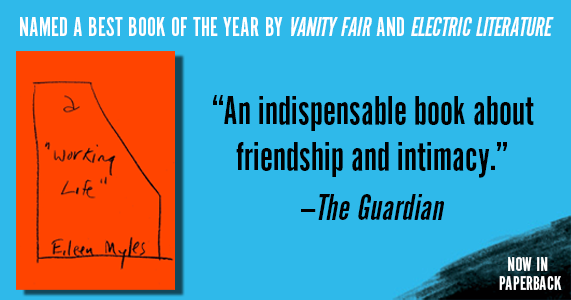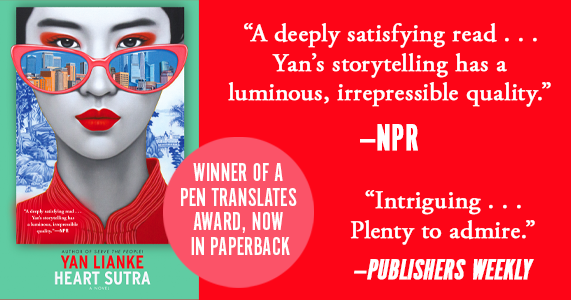Loren and I walked the railroad tracks along the river coming back from fishing the big pool under the old iron bridge, and I couldn’t remember a lovelier evening before or after our world changed. Down by the rushing stream, banks of wild yellow irises shimmered in the twilight, and up in the vaulted corridor that the tracks cut through the trees, the mild June air was filled with twinkling green fireflies. We’d both been drinking some of Jane Ann’s wine.
“It reminds me of Christmas at the mall,” he said.
“I don’t miss the mall,” I said. “I miss a lot of things, but not that.”
“Most of my life happened in the old days. Yours too, Robert.”
It made me sad, but I didn’t say so because the evening was so beautiful and that was something to be grateful for. Now and then, the fireflies pulsed in unison, mysteriously, as if they all agreed on something we humans didn’t know about.
“I wish I had a jar. I’d catch some,” Loren said. The fact that he was our minister and fifty-two years old had not diminished his boyish enthusiasm, which was one reason we were such close friends. He pulled out the bottle again, and polished off the dregs. Jane Ann, Loren’s wife, made good wine, considering what we had to work with around here. She flavored this batch with sweet woodruff to round off the foxy roughness. When the bottle was empty Loren pretended to try to catch fireflies with it, but he was obviously just clowning around. Finally, he stuck the bottle in the back flap of his fishing vest to take home and reuse. We resumed walking the tracks.
“I’ve been thinking lately,” he said.
“It’s not healthy to obsess about the past.”
“No, I’ve got an idea.”
“Oh? Let’s hear it.”
“We should start a laundry.”
“A laundry?”
“Yeah, a community laundry. A place where people bring their clothes and bedsheets and all, and they get washed there.”
“What about Mrs. Myles?” I said. Lucy Myles was my neighbor. She took in quite a bit of other people’s washing.
“She could work for us,” Loren said.
“Us?”
“Well, that’s why I’m telling you about this. We’d be partners.”
“I don’t know the first thing about running a laundry.”
“No, your job is to help me start it up. Fix the building. Figure out the water system. Get the tubs going. Keep things running. You know how to do all that stuff.”
“Where do you think you would do this?”
“We can use the old Wayland-Union Mill building. The title’s open,” he said, meaning that the owners were known to be dead with no heirs and assigns, a common condition in these times. “It would be useful for everybody. And we could make a little honest profit too.”
“What do you do with the dirty water?”
“Into the river,” he said.
“It’s got soap in it.”
“It’s just gray water. It’ll go downstream to the Hudson.”
“That’s not right.”
“It’s below where we fish. And mostly from town. It’s just soapy water.”
“That’s a hell of an attitude.”
“Don’t get all environmental with me,” he said.
“I wouldn’t dump soapy water in the river.”
“It wouldn’t affect anything.”
“I wouldn’t be so sure.”
“You’re being an asshole.”
“Nice talk, Reverend.”
“I’ve been thinking about this for a long time.”
“Maybe you should think about it longer.”
“Condescending prick.”
“Vulgarian.”
“Nabob of negativism.”
I let him have the last word. It was always better that way with Loren. He could keep it up forever. We walked a ways more, enjoying the silence and the fireflies.
“Nabob of negativism?” I said. “Where’d you get that one?”
“Spiro T. Agnew.”
“Who was he?”
“Vice president under Nixon.”
“Oh? I don’t remember Nixon too well.”
“Agnew used to call news reporters ‘nattering nabobs of negativism.’”
“He wouldn’t be able to say that nowadays, would he?”
“No, he’d have to call them nabobs of nothingness,” Loren said and laughed at his own joke. I guess I didn’t think it was that funny, since we didn’t have news reporters anymore and you barely knew what was going on five miles away. “Hey, look,” he said. “Give this laundry idea a chance. It would be good for the community. Try not to be negative.”
“I’m not negative.”
“Contrary then.”
“I’m not contrary.”
“You should hear yourself.”
Eventually the train tracks crossed over Lovell Road, and we got off them there while the road took us across the river on a steel and concrete bridge that was falling to pieces now. It had been years since the state of New York repaired any of these things. There were big holes in the deck you could see clear through. Another couple of spring floods and it might be swept away altogether. On the far bank stood an old hydroelectric station, or the brick shell of one. An inscription in the masonry lintel over the door said it was built in 1919. The big power company, Niagara Mohawk, closed down all these little generating plants in the 1960s because they were supposedly inefficient. Nothing was left but the walls and part of the roof. The turbines and metal parts had long since been sold for scrap and every other useful thing was scavenged out. We couldn’t replace them anymore. It was too bad because it might have lit up our whole town. Anyway, the little dam there had been breeched, and rebuilding that would have been more than our community could manage. I don’t know if anybody would even have known how to do it. It was chilling to reflect on how well the world used to work and how much we’d lost.
We stopped halfway across the bridge in the lovely pink light that remained of the long June day and peered down to the water. Scores of big trout finned in the current beside the crumbling bridge abutment. A nice hatch of cream-colored mayflies fluttered off the water and mingled with the fireflies. The swift little mud swallows that nested under the bridge did an aerial ballet through it, gorging themselves. Plenty of mayflies would still get away for their one ecstatic night of reproducing in the treetops. They would return to the river to die the next morning. It was called the “spinner fall.” They’d been doing it for millions of years before we showed up.
“Want to go down and try some?” I said.
“My creel is full,” Loren said.
“We could put back what we catch.”
“I’ve fished enough tonight, Robert.”
“Okay, let’s go home.”
It was about a three-mile walk home to Union Grove. In the old days, you’d drive it, of course, but now you walked. I didn’t mind. I enjoyed the peacefulness and easy pace of the walk. In a car, I remembered, you generally noticed only what was in your head or on the radio, while the landscape itself seemed dead, or at least irrelevant. Walking, it was impossible to not pay attention. On a mild luminous evening like this, the landscape came alive. The crickets had started up. In the distance a last glimmer of sun caught the top of Pumpkin Hill where men were still out mowing the first hay crop on the Deaver farm. You could hear their horses from down where we were, and someone was singing while he worked. Washington County is a terrain of gentle hills and close valleys that grows more rugged as you get east over toward the Vermont border, where the Green Mountains begin in earnest. In the early twenty-first century, farming had all but died out here. We got our food from the supermarket, and not everybody cared where the supermarket got it as long as it was there on the shelves. A few elderly dairymen hung on. Many let their fields and pastures go to scrub. Some sold out to what used to be called developers, and they’d put in five or ten poorly built houses. Now, in the new times, there were far fewer people, and many of the houses outside town were being taken down for their materials. Farming was back. That was the only way we got food. Ben Deaver employed at least twenty men from town on his farm. You could smell the horses down where we were on the bridge. Sometimes the whole world smelled of horse. It was my fond wish to own one some day.
Across the bridge, Lovell Road came to a T at old Route 29, which used to be the main route between the Hudson Valley and Arlington, Vermont. It was a standard state two-laner. We headed west toward town on it. When the sun finally went down, the sky above the hills remained pale blue, the cloud bottoms all salmon and orange. We walked right down the middle of the highway, over the faint ghost of the double yellow line. After years of neglect the pavement was broken with great fissures and potholes the size of a bathtub. In some stretches, it had gone back to dirt. Loren and I were both lost in our own thoughts when we heard horses at a distance coming up behind us. We turned together.
It was an open cart with two wooden-spoked, iron-rimmed wheels, not the old automobile tires that you used to see on a common utility wagon. You could still find rubber tires here and there, but you couldn’t get patch kits or the kinds of adhesives that would stand up to a repair job anymore, so we had no choice but to go back to wooden wheels with iron rims. This sort of vehicle was sometimes referred to as a Foley rig. I couldn’t tell you who Foley was, but that’s what it was called. There were stories, as about so many things in these new times, where the actual facts were sparse or elusive, but they named the rig after him. There were two figures aboard, a man driving and a woman beside him.
The rig came trotting out of the twilight, bouncing on the rough road, until it reached us and the driver slowed his team to a walk. They were fine, tall, stout matched blacks with some feathering on their lower legs, a mix of some kind. Since the world changed, there had not been much time to breed horses, so around here anything distinct from the American quarter horse or a common draft animal tended to stand out. These looked like they had some Percheron or other cold blood in them and their size, at least sixteen hands, was another sign. The driver brought them to a halt beside Loren and me.
He was a stranger, a clean-shaven, middle-aged man, with a nose too small for his face. It made him look oddly boyish. Among men in Union Grove, beards were the norm so any clean-shaven man was apt to look young. He took off his broad-brimmed straw hat so as to show off, or so it seemed, his full head of black hair with a few strands of gray at the temples. His skin had a pinkish cast, as though he spent a lot of time indoors.
“Brother Jobe,” he said, reaching down from his seat to press our flesh like a politician. We would learn later that he spelled it this way, with an e on the end.
“Loren Holder’s the name.”
“How’d you do?” Brother Jobe said.
“Fine,” Loren said. “Beautiful evening.”
“No, I meant how did you make out fishing?”
“Oh, pretty good,” Loren said.
“I hear the river’s better’n it ever was before,” Brother Jobe said.
“It’s quite good,” Loren said. “Less angling pressure nowadays.”
“I haven’t had the time to try it myself. Busy tending to my flock.”
I couldn’t help glancing at the young woman beside him. She had been sitting very still, like a startled doe, as if stillness might enable her to remain unscrutinized. Both she and Brother Jobe were dressed in the severe clothing of the pious. He had on a black sack suit, a cotton shirt with collar points, and a floppy black bow tie. She wore a straw hat secured under her chin with a black ribbon. She’d gathered her thick red hair into a single braid. Her skin was so pale as to appear luminous in the low light. The longer I looked the more I noticed that she had a good figure within her plain muslin blouse. Though it was buttoned to her throat, you could see the shadows of her flesh within. Her delicate face suggested she was not much more than sixteen. Few young women were left in our town. The Mexican flu had been especially vicious among the young, though death by other means had not spared any age group.
“Say, aren’t you the chief over at First Congregational?” Brother Jobe asked Loren.
“I’m the minister there, yes.” Loren said. “How’d you know?”
“I’ve got an outfit of my own,” Brother Jobe said, as if that answered the question.
“Oh?” Loren said. “Whereabouts?”
“Why, right here in Union Grove.”
Loren cut a puzzled glance my way.
“Bought the old high school day before yesterday,” this Brother Jobe said.
With the recurrent sickness and the problems with electricity and everything else, the sprawling, low-slung high school complex at the north edge of town had fallen into disuse. Once, it had collected pupils spread out over half the county in a fleet of shiny yellow buses. The small number of children in our community went to the church school now.
“That’s a surprise,” Loren said.
“We’ve been on a hard and prayerful search,” Brother Jobe said. “This place looked about perfect.”
“How many of you are there?”
“Seventy-three adults.”
“Where’d you come from.”
“We were last in Pennsylvania.”
“Why did you leave?” I said.
Brother Jobe regarded me closely for a moment, as though my question were impertinent.
“We weren’t comfortable there,” he said. “Who are you?”
“Name’s Robert Earle.”
“Robert Earle what?”
“Just Earle. That’s the family name.”
“Oh? Down where we’re from that’d be a man’s given name.”
“Like Billy Bob.”
“Exactly.”
“I take it you hail from Dixie,” Loren said.
“Indeed I do,” Brother Jobe said, running a sleeve across his damp brow. It must have been uncomfortable for him in a suit on a warm summer night like it was.
“A troubled place these days, isn’t it?” Loren said.
“There’s plenty of mischief to go around this poor country of ours. What’s left of it.”
“We don’t get much news of the outside anymore,” Loren said.
“The electric’s hardly on these days.”
“We’ve noticed,” Brother Jobe said. “But you’ve got something here maybe even more valuable.”
“Yeah?” Loren said. “What’s that?”
“Peace and tranquillity.”
“The last real news we had was when the bomb went off in Los Angeles.”
“California got dealt a bad hand, all right,” Brother Jobe said, “but things are rough from sea to shining sea. It’s no fun in Phoenix or Albuquerque either, so I’ve heard. From Texas clear to Florida, there’s folks shooting each other and trouble between the races and all like that. Seems like the law is on the run everywhere. We were on our way up out of Virginia when the other bomb hit Washington, D.C. Pennsylvania wasn’t no picnic after that, I can tell you. We tried it for more than two years, but it wasn’t any go for us there. We pulled out the end of April.”
“I’d like to hear what you’ve observed on your travels sometime,” Loren said.
“Hardship. Not a whole lot of brotherhood.”
“This is a friendly place,” I said. “But it would have been nice if the powers that be had consulted us about selling the school. We weren’t informed.”
“It’s all signed and legal, I assure you.”
“It seems to have happened under cover of night,” I said.
“Are you up to the Lord’s business too?” Brother Jobe asked me pointedly.
“In a manner of speaking,”
“How’s that?”
“I’m a carpenter,” I said.
Brother Jobe pointed at me and laughed, the way comedians used to do long ago on TV. The girl beside him cracked a trace of a smile too, but looked away self-consciously when she saw me notice. Eventually Brother Jobe’s strenuous hilarity ebbed.
“Let’s have a look in those creels, boys. I’ve got to see those whoppers you bragged on.”
Loren opened up his creel and held it up to show.
“Hooo-weee,” Brother Jobe said. “I’ll take ’em.”
“Excuse me?” Loren said.
“Five hundred bucks, American.”
“They’re not for sale.”
“Aw heck, okay, seven hundred fifty.”
“No, I—”
“You boys drive a hard bargain,” Brother Jobe said and whipped out a fat roll of bills. “Here’s a thousand. Lay them babies right down there under the dash by my boots.”
Loren shot a look at me that attempted to convey a humorous appreciation for all this but really signaled his discomfort. He liked to make other people happy but not usually at his own expense. He had lined his creel with ferns to keep his four nice trout cushioned and moist, and he now laid them all down, including the ferns, like a kind of grocer’s display, at the driver’s feet up under the Foley’s curved mudguard.
“Let’s see yours now,” Brother Jobe said to me.
“I didn’t get any.”
He guffawed. “Like fun you didn’t. Let’s have a look.”
“There’s nothing to show.”
“I thought you said it was good fishing down there tonight.”
“It was good for him, not so good for me.”
He held up the bankroll again. “Sure you won’t talk to the old persuader?”
“A dollar isn’t what it used to be.”
“That’s the God’s truth. But heck, I’ve got a flock to feed.”
“Sorry.”
Brother Jobe made a kind of show of looking deflated for a moment, then pulled himself upright and puffed out his cheeks.
“All right then. I hope you have better luck next time. We’ll be starting a regular service soon in that old school auditorium. Maybe you’ll come by sometime.”
“I’m in his outfit,” I said, cocking my head at Loren.
“We put on a hell of a show. Hymns and preaching. I got a 1930 Schwimmer pump organ. It’s like the old-timey times.”
Smiling broadly, Brother Jobe raised his whip and sort of dusted both horses over the hindquarters. They snorted and began to walk. They were well trained. We watched them set off and a little way down he got them trotting. He never did introduce us to his companion.





